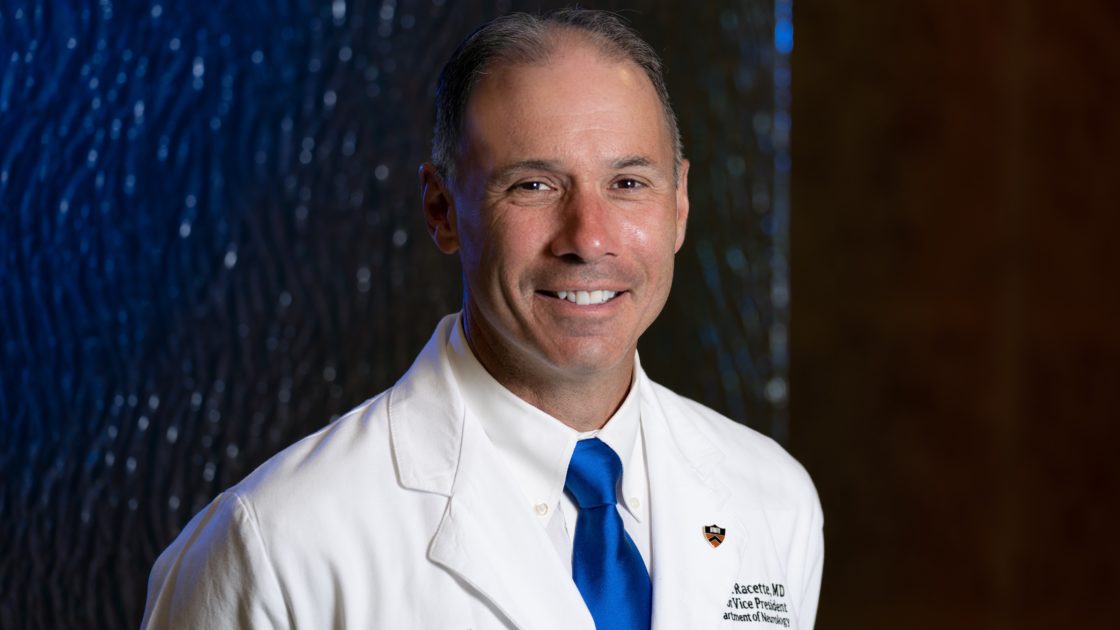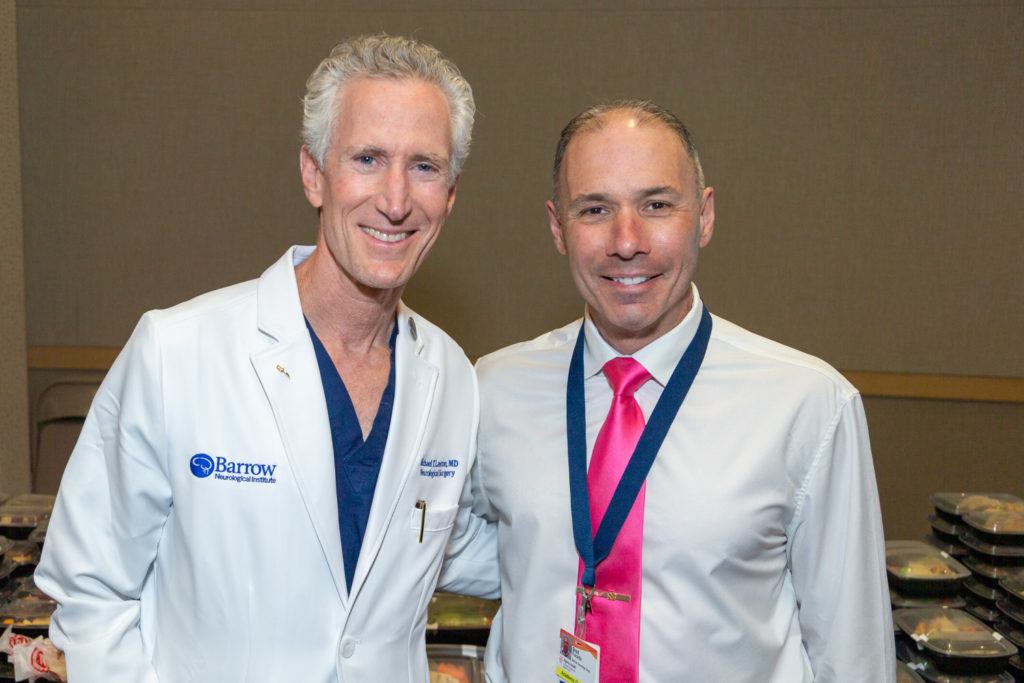
#TheMindBehind the Department of Neurology: Brad A. Racette, MD
Brad A. Racette, MD, views himself as a medical detective—whether he’s investigating why people get neurological diseases or assembling clinical clues to diagnose a movement disorder.
Dr. Racette isn’t deterred by the challenge of finding answers to difficult questions; he’s motivated by it.
“When I did my clerkships in medical school, neurology was by far the field where I felt I would be the most challenged for the duration of my career,” he recalled.
That motivation also led him to the helm of the Department of Neurology at Barrow Neurological Institute.
Choosing Neurology
Dr. Racette remembers considering a career in medicine as a high school student. He enrolled in Princeton University in New Jersey as an undergraduate student with the idea that he would attend medical school eventually.
“I don’t know that it was a particularly informed decision,” he confessed. “I didn’t have any family members in medicine, and we didn’t have the luxury of as many shadowing opportunities back in the 80s.”
But he was a good student, and he saw many other good students pursuing medical careers.
As a molecular biology major at Princeton, Dr. Racette was required to perform research. He spent several years in a laboratory studying receptors for potential anti-inflammatory drugs.
“I had exposure to biomedical research at that point,” he said. “That was probably a more formative experience.”
When he entered medical school at Northwestern University in Chicago, Dr. Racette was leaning toward a career in orthopedic surgery. To his surprise, he found that he enjoyed his neurology rotation more than any other.
“I thought I would be just as excited about doing neurology in my 60s as I was in my 30s,” he said.
Becoming a ‘Medical Detective’
During his neurology residency at the Washington University School of Medicine in St. Louis, Dr. Racette had a strong mentor in the subspecialty of movement disorders. He had also developed some personal interest in Parkinson’s disease after his grandmother’s diagnosis.
One of the aspects of movement disorders he found most intriguing is that the diagnosis involves piecing together clinical patterns—that concept of being a medical detective.
“You look at people, and you use your senses,” he said. “There aren’t tests for most of these conditions. What people often like most about neurology is that you can do so much with just a neurological exam, and movement disorders is sort of like an extreme version of that.”
Dr. Racette also yearned to understand why people get neurodegenerative diseases like Parkinson’s. That question inspired him to focus his research efforts on risk factors for the disease, particularly those in the environment.
As a movement disorders specialist, Dr. Racette has the opportunity to establish long-term relationships with many of his patients and their family members. Following patients from diagnosis to end-of-life care has given him a better understanding of the course of Parkinson’s disease—and where existing treatments are coming up short.
“It humbles you,” he said. “I think it makes you more compassionate, because you’ve lost a friend in the end. I think that also makes you a better doctor.”
The Barrow Difference
When Jeremy Shefner, MD, PhD, decided to step down from his position as chair of the Department of Neurology at Barrow, President and CEO Michael T. Lawton, MD, encouraged Dr. Racette to apply for the job. But Dr. Racette felt the timing wasn’t right to leave Washington University, where he had been on faculty for over two decades and previously served as vice chairman and executive vice chairman of neurology.
Over the next six months, however, Dr. Racette considered the idea of joining Barrow. He knew Dr. Lawton had presented him with a unique opportunity.
One of the things about Barrow is there are no boundaries. If you can think it up, you can do it.
Brad A. Racette, MD, FAAN
“There’s always a department chair position or two available in the country, but very few of them come with the opportunity to build out a vision that I, as a department chair, develop,” he said.
At Barrow, he wouldn’t simply be managing faculty and “keeping the wheels on the bus.” As an institution that embraces innovation, Barrow would empower Dr. Racette to create and implement an impactful vision.
“One of the things about Barrow is there are no boundaries,” he said. “If you can think it up, you can do it.”
So when Dr. Lawton reached out again, Dr. Racette engaged in the application process and never looked back.
Shaping a Vision
Since assuming the role of chair in April, Dr. Racette has been learning about the department and shaping his vision for its future, starting with four goals.
One of them is to establish a premier program in data science within the department, facilitating the analysis of health care data to discover new insights that could improve patient care.
“I think it’s an area where we can really excel,” he said. “It builds on a program that I developed at Washington University and is really on the cusp of being able to do some extraordinary research.”
Secondly, Dr. Racette hopes to position Barrow as a destination for neurology residents who are interested in global health, both clinically and academically.
For about 15 years, Dr. Racette has collaborated with researchers in South Africa to study manganese toxicity and, more broadly, Parkinson’s risk factors affecting rural communities. He has also worked with researchers in Finland for about five years, examining the possible link between exposure to certain solvents and developing Parkinson’s disease.
“I think it’s essential for our young physicians to understand their place in the global neuroscience environment,” he said. “I think they will be better, more rounded physicians if they have a global experience.”
Dr. Racette also sees the potential for the Department of Neurology at Barrow to become a leader in health equity, not only in patient care but also in education and research.
“There are already some exciting programs in the department that we don’t talk about enough,” he said. “I think we need to build on that success and make this something we’re known for.”
Lastly, Dr. Racette plans to grow the department’s portfolio of clinical research funded by the National Institutes of Health and other government entities. He said this would enable Barrow to continue performing research that could have a widespread impact on human health across the spectrum of neurological diseases.
The Right Move
Dr. Racette isn’t only learning a new department and institution; he’s learning a new city. When he isn’t at work, he’s often exploring the streets of Phoenix on his road bike. He typically logs at least 40 miles on each day of the weekend.
He is also excited to hit the Valley’s hiking trails and host dinner parties in his new home with his wife.
“My specialty is that I make these great homemade pizzas on the grill,” he said. “There are no recipes in the house, but there are a couple pizzas that I make that are sort of fan favorites.”
So far, the summer heat hasn’t made him doubt his decision to move to Phoenix.
“It’s a dry heat,” he said, recalling the discomfort of sticky Midwest summers.
He also believes he made the right choice professionally. Returning to a leadership role has reminded Dr. Racette of how much he enjoys heading a department.
“I look forward to coming in here every day,” he said. “I’m booked from top to bottom and having a great time doing it.”

